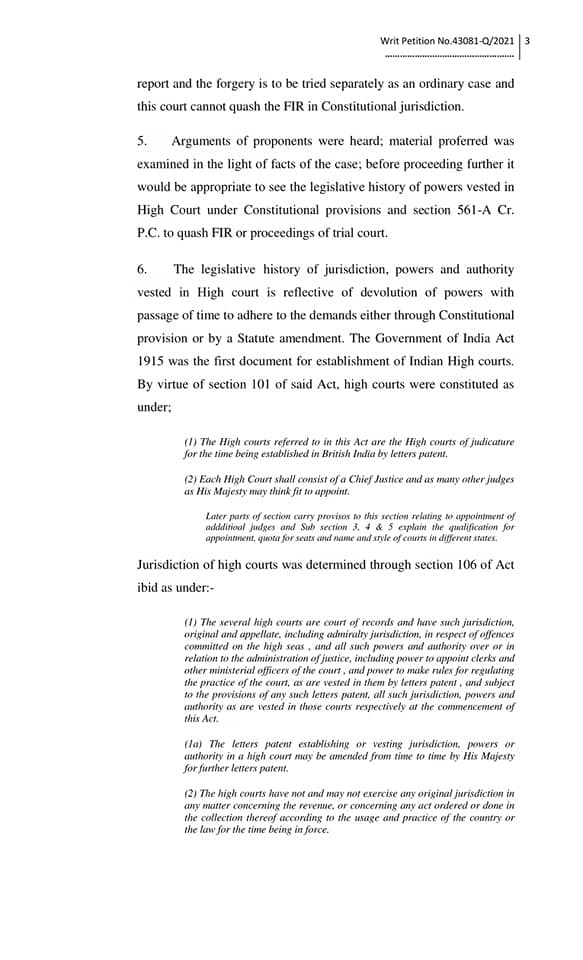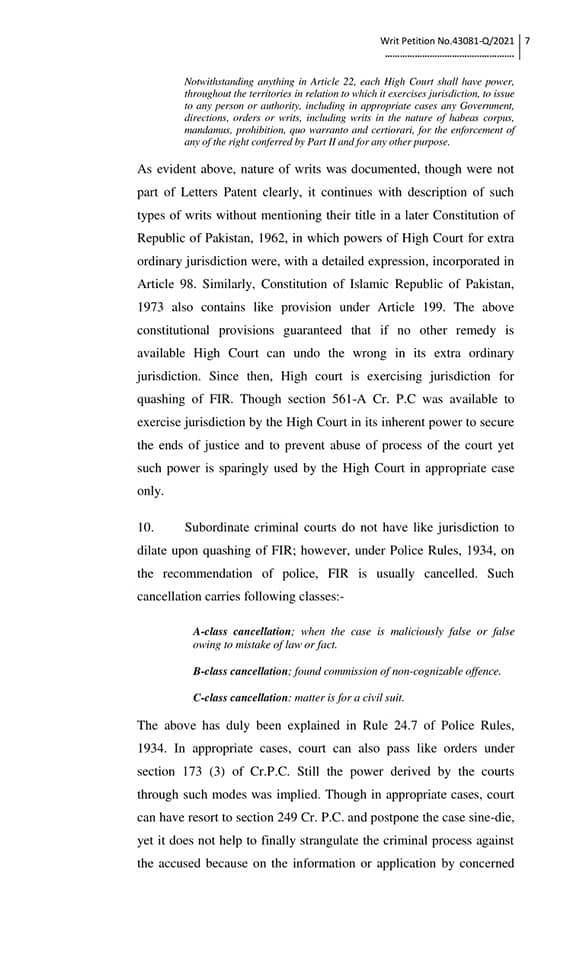2021 LHC 8241
The legislative history of jurisdiction, powers and authority vested in High court is reflective of devolution of powers with passage of time to adhere to the demands either through Constitutional provision or by a Statute amendment. The Government of India Act 1915 was the first document for establishment of Indian High courts. By virtue of section 101 of said Act, high courts were constituted.
Jurisdiction of high courts was determined through section 106 of Act .
The above provisions reflect that a high court can be established and jurisdiction, powers and authority could vest in through letters patent by His Majesty as authorized under above cited Act; therefore, in pursuance thereof through letters patent, Lahore High Court was established on 31st March, 1919.
Cl. 5. of letters patent deals with writs, etc. to issue in the name of State and under seal; whereas, criminal jurisdiction of High Court was scoped.
The above powers were directed to be regulated through Code of Criminal Procedure, 1898.
This ordinary and extra ordinary jurisdiction though was vested on High Court yet it was mainly related to trial of any person; miscellaneous proceedings though were being regulated yet no exact provisions was available to save the inherent power of high court under code of criminal procedure. Polity was being extended and crime was reported at a comparably higher rate, ingenious methods were being invented to trap the individuals in unnecessary litigation, false and frivolous reporting of crime was rampant; therefore, in order to circumvent the process or to save the innocent breachers or scape goats, legislature felt the necessity and introduced drastic changes in code of criminal procedure through new legislation in the form of “Code of Criminal Procedure (Amendment) Act, 1923 (Act No. XVIII of 1923)”; whereby many sections of Code of criminal procedure were amended, similarly, under said Act at item No. 156, following new section was also introduced;
The powers of existing High Courts were given protection even in a later legal instrument in the form of Government of India Act 1935.
Part III of Act deals with Provincial legislature which means all the existing powers of High Court shall be subject to any further legislation. Later when Pakistan came into being, the Government of India Act, 1935 was adopted to run the government machinery through such legislated document.
A trend in our society of false implication of innocent people was rampant and the courts were put on guard to see through the case on the principle of “Sifting the grain from the chaff” that was the reason principle of “Falsus in uno, falsus in omni bus” was not applicable in Pakistan since early 50’s. There was no provision available in the code of criminal procedure 1898 to the subordinate courts to extend early escape from the net thrown on the accused. Only remedy available was being regulated through constitutional provision because by then provision relating to sending reference u/s 432, 433 Cr. P.C stood omitted by AO of 1949. Historically after advent of Pakistan, The High Court was established through first Constitution of Pakistan, 1956 and Article 170 of said Constitution gave such powers to The High Court.
As evident above, nature of writs was documented, though were not part of Letters Patent clearly, it continues with description of such types of writs without mentioning their title in a later Constitution of Republic of Pakistan, 1962, in which powers of High Court for extra ordinary jurisdiction were, with a detailed expression, incorporated in Article 98. Similarly, Constitution of Islamic Republic of Pakistan, 1973 also contains like provision under Article 199. The above constitutional provisions guaranteed that if no other remedy is available High Court can undo the wrong in its extra ordinary jurisdiction. Since then, High court is exercising jurisdiction for quashing of FIR. Though section 561-A Cr. P.C was available to exercise jurisdiction by the High Court in its inherent power to secure the ends of justice and to prevent abuse of process of the court yet such power is sparingly used by the High Court in appropriate case only.
Subordinate criminal courts do not have like jurisdiction to dilate upon quashing of FIR; however, under Police Rules, 1934, on the recommendation of police, FIR is usually cancelled. Such cancellation carries following classes:-
A-class cancellation; when the case is maliciously false or false owing to mistake of law or fact.
B-class cancellation; found commission of non-cognizable offence.
C-class cancellation: matter is for a civil suit.
The above has duly been explained in Rule 24.7 of Police Rules, 1934. In appropriate cases, court can also pass like orders under section 173 (3) of Cr.P.C. Still the power derived by the courts through such modes was implied. Though in appropriate cases, court can have resort to section 249 Cr. P.C. and postpone the case sine-die, yet it does not help to finally strangulate the criminal process against the accused because on the information or application by concerned party or report by police case can be reopened. Therefore, it was expedient for legislature to introduce a provision in Cr. P.C to give an inherent power like provision to the Subordinate Criminal Courts. the Law Reforms Ordinance, 1972 once again brought drastic changes in Cr.P.C and apart from others, Chapter XXII-A was introduced for sessions trial which includes section 265-k.
This section was applicable for session trial only and a sessions Judge could exercise powers under this section for an offence triable by court of session alone. No provision of like nature was available to the Magistrates; therefore, section 249-A Cr. P.C was inserted through the Code of Criminal Procedure (Amendment) Ordinance, 1977 (Ordinance of XXXVI of 1977).
Under above sections subordinate criminal courts are authorized to acquit the accused at any stage of the case and this power is synonymous to one the High Court exercise u/s 561-A Cr. P.C., but if they fail to exercise powers then High Court either under Article 199 of the Constitution of Islamic Republic of Pakistan or under section 561-A of Cr. P.C. can either quash the proceedings pending in the court subordinate thereto or quash the FIR.
It is trite that second FIR is not permissible under the law.














0 Comments